The Concept of a Knowledge Worker
- Peter Drucker proposed the concept in 1959.
- Knowledge worker should:
- Have advanced formal education.
- Use theoretical and analytical knowledge.
- Be a “continuous learner and a specialist in a field” (as cited in McGonigle & Mastrian, 2017, p. 117).
- Be able to perform “collaborative, specialized, and dynamic” tasks (Finn et al., 2016, p. 92).
- McCormick (2009) indicates the importance of
- Search.
- Evaluation of information (as cited in McGonigle & Mastrian, 2017).
- Androwich (2010) suggests that healthcare information should be
- Accessible (i.e., evidence-based information).
- Ready for future use (patient data available in medical facilities) (as cited in McGonigle & Mastrian, 2017).
The concept of “knowledge worker” was proposed by an author and educator Peter Drucker in 1959 in his book called Landmarks of Tomorrow (McGonigle & Mastrian, 2017). Knowledge work might be described as nonrepetitive, nonroutine, and involving a significant share of cognitive activity. According to Drucker (1994), a knowledge worker is a person who received an advanced formal education, uses theoretical and analytical knowledge, and is also a “continuous learner and a specialist in a field” (as cited in McGonigle & Mastrian, 2017, p. 117). The tasks performed by knowledge workers might be described as “collaborative, specialized, dynamic, ad-hoc, or even unstructured, and often highly dependent on the domain knowledge and expertise of the worker” (Finn et al., 2016, p. 92).
McCormick (2009) expects a knowledge worker to spend about half of his or her time on search and evaluation of information (as cited in McGonigle & Mastrian, 2017). Androwich (2010) suggests that healthcare information should be accessible and ready for future use (as cited in McGonigle & Mastrian, 2017). Nurses need evidence-based information and patient data available in medical facilities to be able to inform present patients. Additionally, patient data should be entered in a way that it could be easily accessed in the future. Therefore, knowledge workers, as the source of organizational success and growth, should have specialized advanced education, a high degree of autonomy in their workplace, and the ability to work in a multidisciplinary environment.
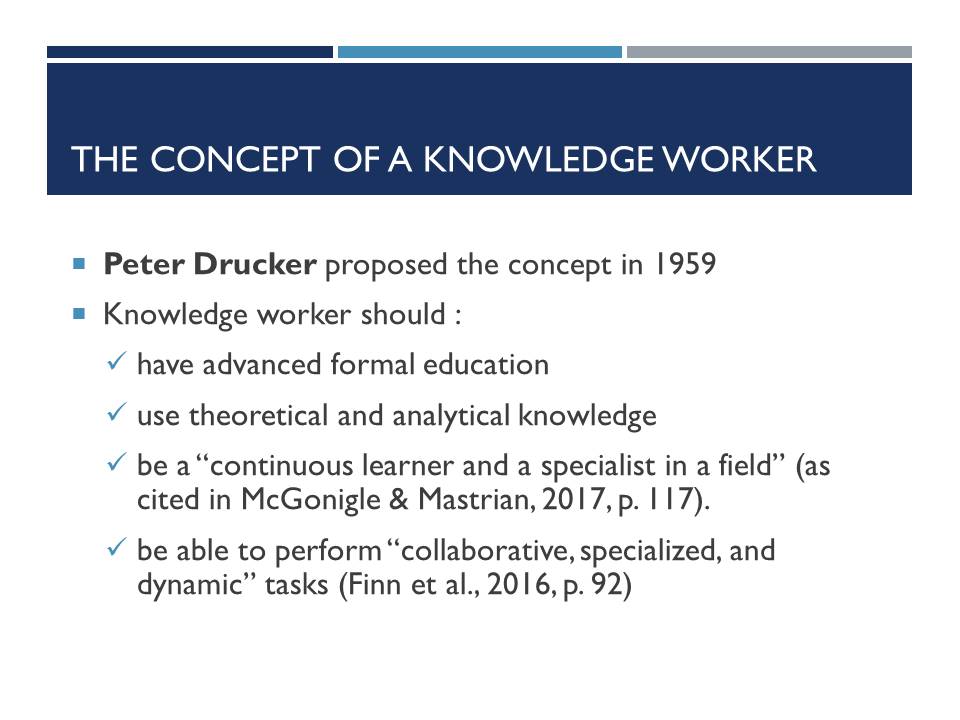
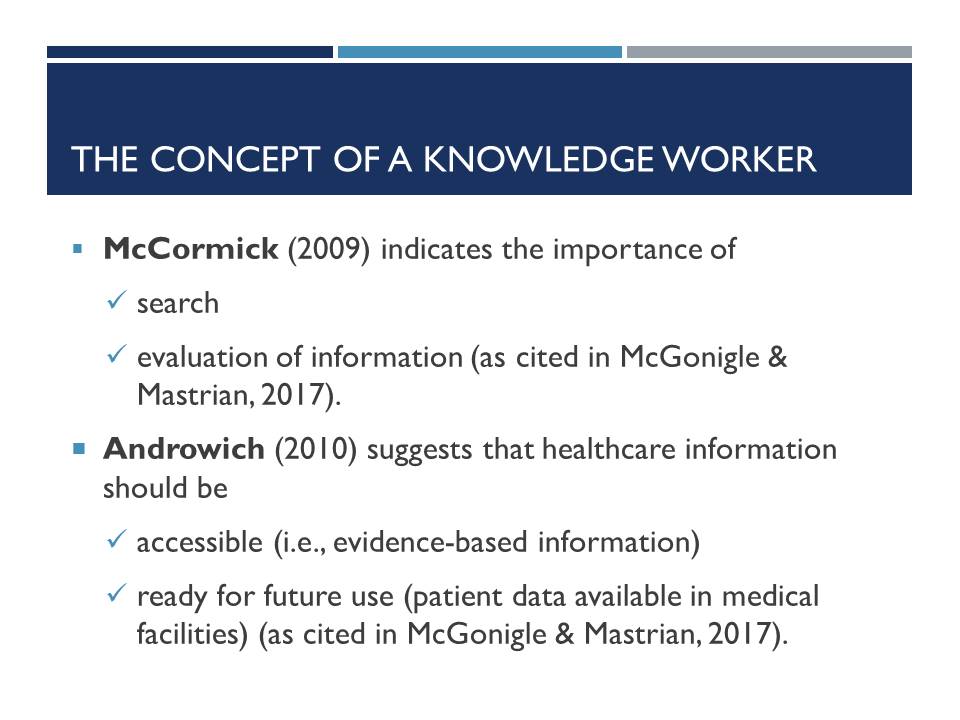
Nursing informatics
- Healthcare informatics = healthcare sciences + information science + cognitive science (Sweeney, 2017, “Introduction,” para. 1)
- Effects:
- Improved quality of care;
- Better health outcomes;
- Enhanced patient education;
- Quick access to information;
- Large amount of data to be collected, managed, and analyzed.
Healthcare informatics may be defined as “the integration of healthcare sciences, computer science, information science, and cognitive science to assist in the management of healthcare information” (Sweeney, 2017, “Introduction,” para. 1). According to the American Nurses Association (ANA, 2001), nursing information is “a specialty that integrates nursing, information, and knowledge in nursing practice” (as cited in Sweeney, 2017, “Introduction,” para. 1). Because of multiple technological advances, healthcare and nursing informatics have been continuously growing within the medical field. The positive results of such progress are improved quality of care, better health outcomes, and enhanced patient education. On the other hand, while the implementation of technology ensures quick access to medical information, it also increases the amount of data to be collected, managed, and analyzed by healthcare providers.
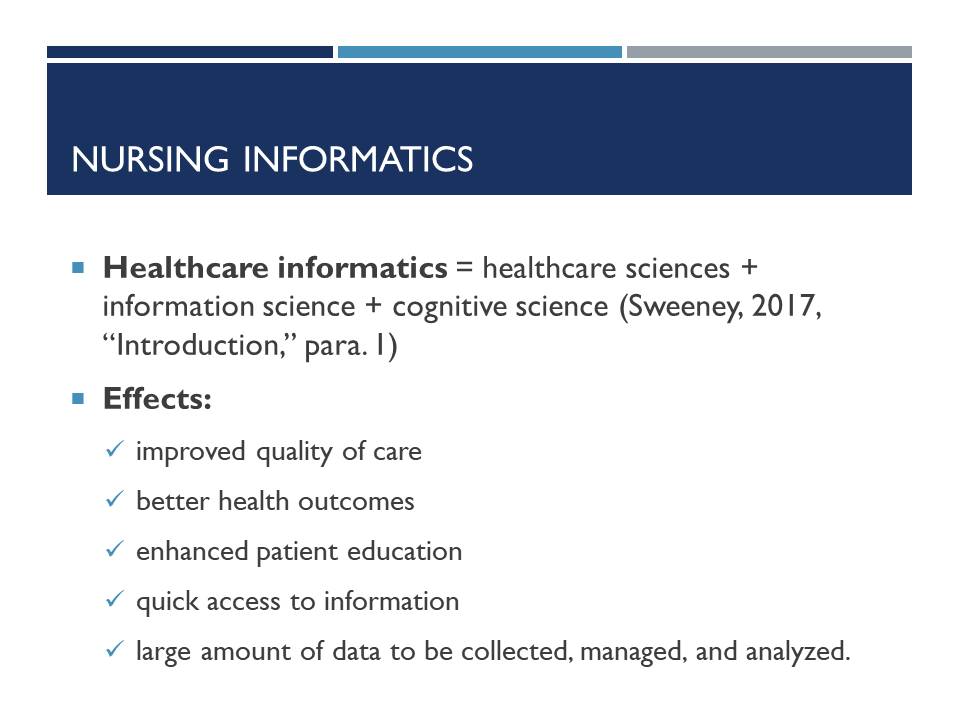
The role of a nurse leader as a knowledge worker
- 22 million households using virtual care solutions in 2018.
- Advanced education options = a source of informatics knowledge and skills.
- Executive level positions available:
- Chief Nursing Informatics Officer.
- Chief Medical Informatics Officer (Nagle et al., 2017).
- The roles of a nurse leader as a nursing informatics specialist:
- Acquisition, implementation, and evaluation of clinical information (Nagle et al., 2017, p. 213).
- Executive oversight, systems education and training.
- Project management and analytics.
- Development of new solutions for businesses.
Nurse Leader = core to information management and support in medicine, technology, retail, and consulting.
By 2018, 22 million households are expected to make use of virtual care solutions (Nagle. et al., 2017). The role of nursing informatics specialists continues to evolve rapidly in response to new technologies and an increased significance of data analytics. Therefore, the role of a nurse leader as a knowledge worker requires a wide range of practical skills and in-depth knowledge of nursing informatics. Today, the options for advanced education help nurse leaders to achieve credibility and gain informatics knowledge and skills, as well as a way to take executive-level positions such as the “Chief Nursing Informatics Officer” and “Chief Medical Informatics Officer” (Nagle et al., 2017).
Nurse leaders specializing in nursing informatics might be found in most healthcare organizations performing a multitude of roles largely focused on “acquisition, implementation, and evaluation of clinical information systems” (Nagle at al., 2017, p. 213). Such specialists are crucial for the medical organization’s functioning at every step of its life cycle, providing executive oversight, systems education, and training, project management, and analytics. Therefore, a nurse leader as a knowledge worker might be considered a core to information management and support in clinical settings. However, not only healthcare organizations, but also technology enterprises, retailers, and consulting companies use the valuable knowledge and skills of nursing information specialists. Worldwide, nurse leaders with an academic background in informatics contribute to the increase in sales and the development of new solutions for businesses.
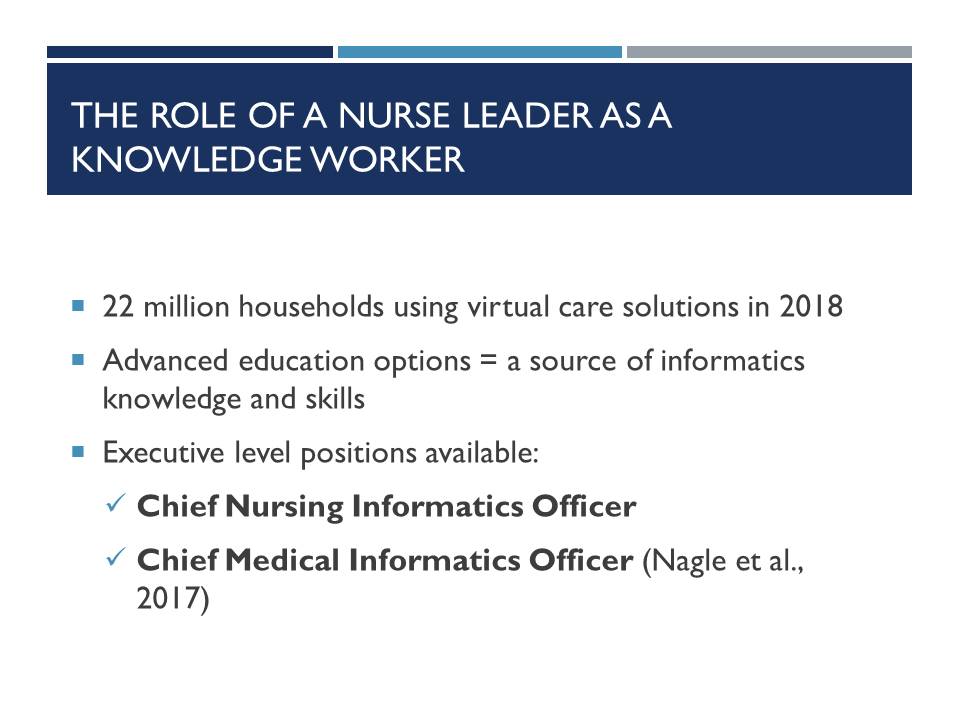
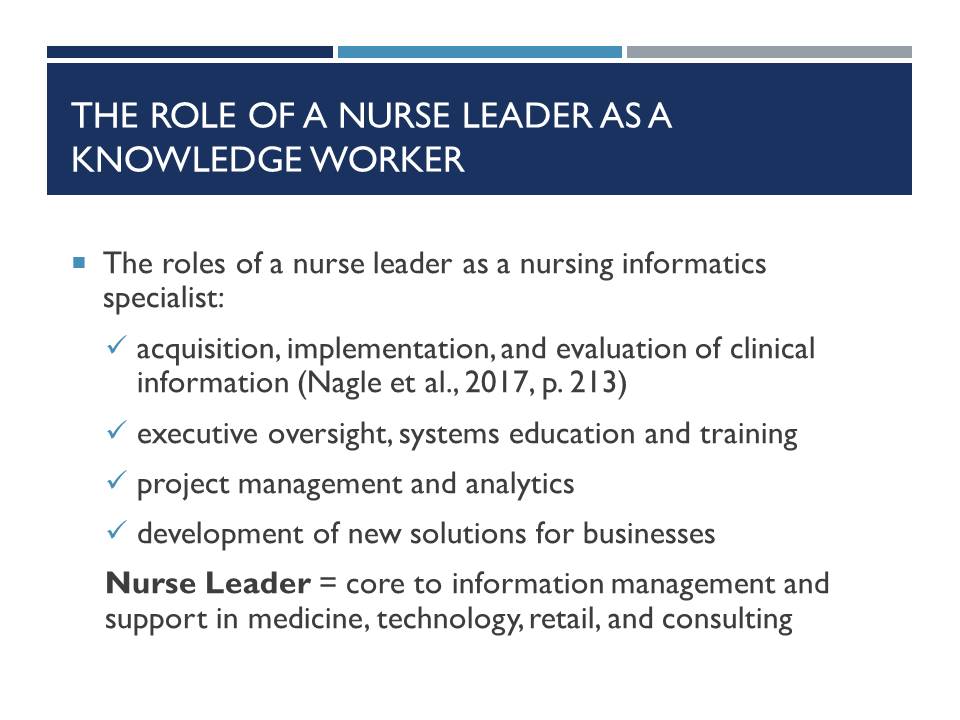
Infographic
The infographic is based on the concepts examined in the work. The first two figures on the left refer to the characteristics proposed by Peter Drucker, which are crucial for becoming a knowledge worker. Additionally, the figures in the middle include the central notion of a nurse as a knowledge worker as well as two possible executive-level positions above and below the figure. Finally, the figures on the right illustrate the roles of a nurse leader as a knowledge worker in both medical (the first three figures) and business settings (the last one).
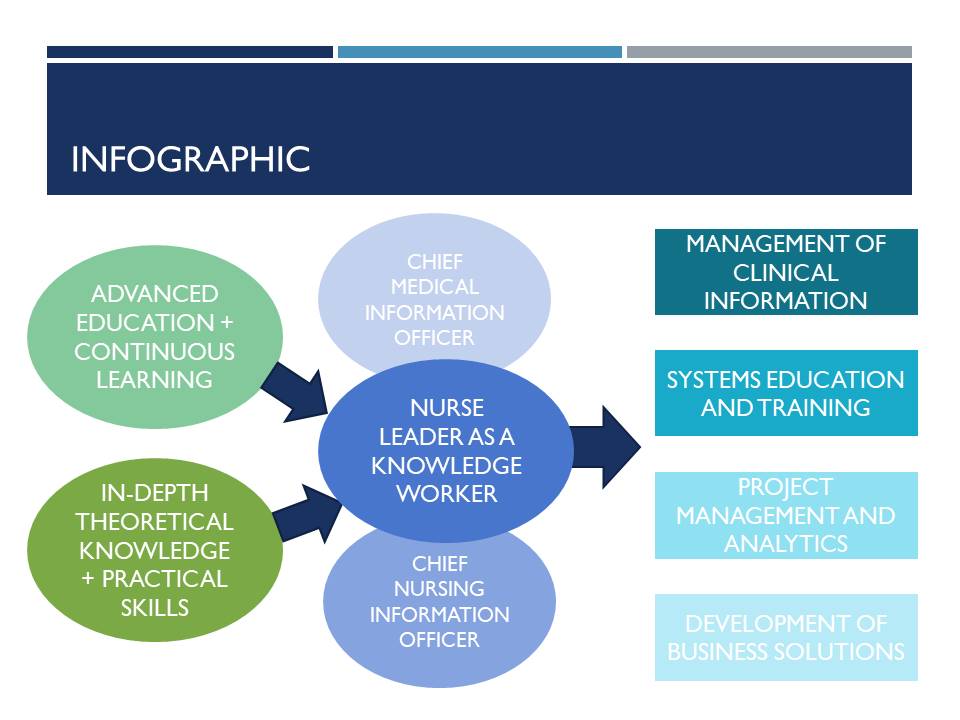
Scenario
- Home care admission.
- 69-year old male with COPD, alert and oriented.
- Assessment and vitals are registered in tablets which nurses use at work.
- Point-of-care mobile app is used to access medical records (patient’s previous vitals, labs, history, and physicals).
- Examination of the patient’s data was necessary for evaluation of his condition and effective care.
- Medical data was collected by documenting real-time patient’s assessment and vitals in the app.
- The nurse was able to derive knowledge on the patient’s condition from the app’s previous medical records.
The following hypothetical scenario will be used to illustrate how data can be collected and what knowledge might be derived from it. Nurses are monitoring a 69-year old alert and oriented male with COPD during home care admission. Each nurse has a tablet to chart their assessment and the patient’s vitals. The point-of-care mobile application on nurses’ tablets allows them to access the patient’s data such as his previous vitals, results of lab testing and physical exams, complete medical history. Upon reviewing the medical data, the nurse was able to provide the patient with adequate care and education.
It is worth mentioning that the examination of the patient’s medical records available at the point-of-care app allowed the nurse to effectively evaluate the patient’s condition and offer him appropriate care. The patient’s current medical data was collected by documenting real-time assessment and vitals in the app, making it available for future use. The nurse was able to learn about the patient’s condition accessing his previous medical records registered in the point-of-care app. Therefore, the nurse’s knowledge of informatics and practical skills provided the patient with the benefits of digital technology in healthcare.
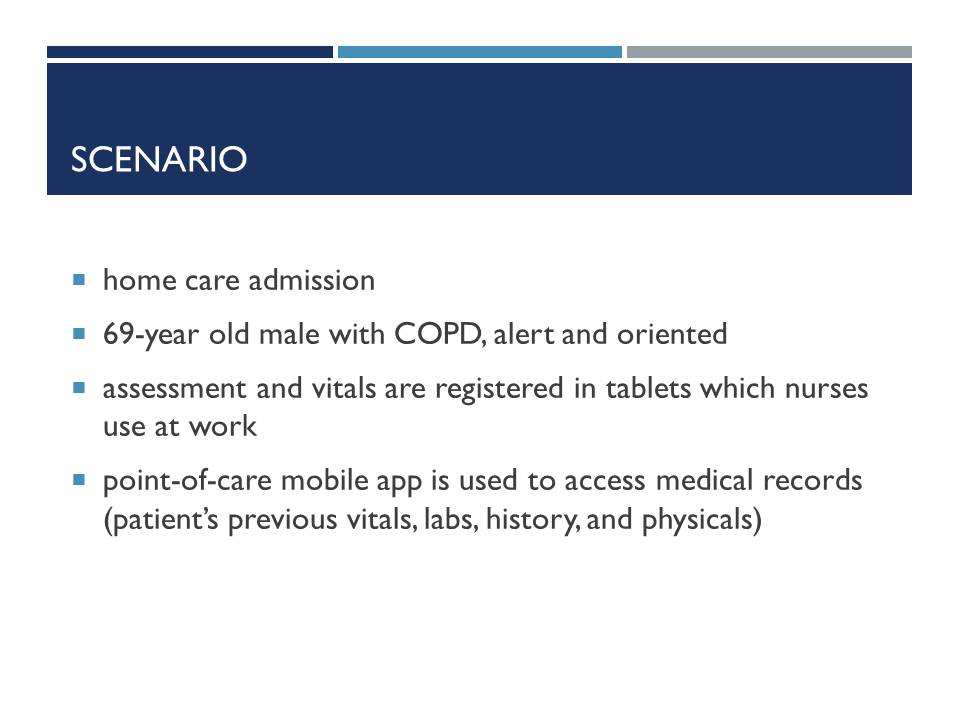
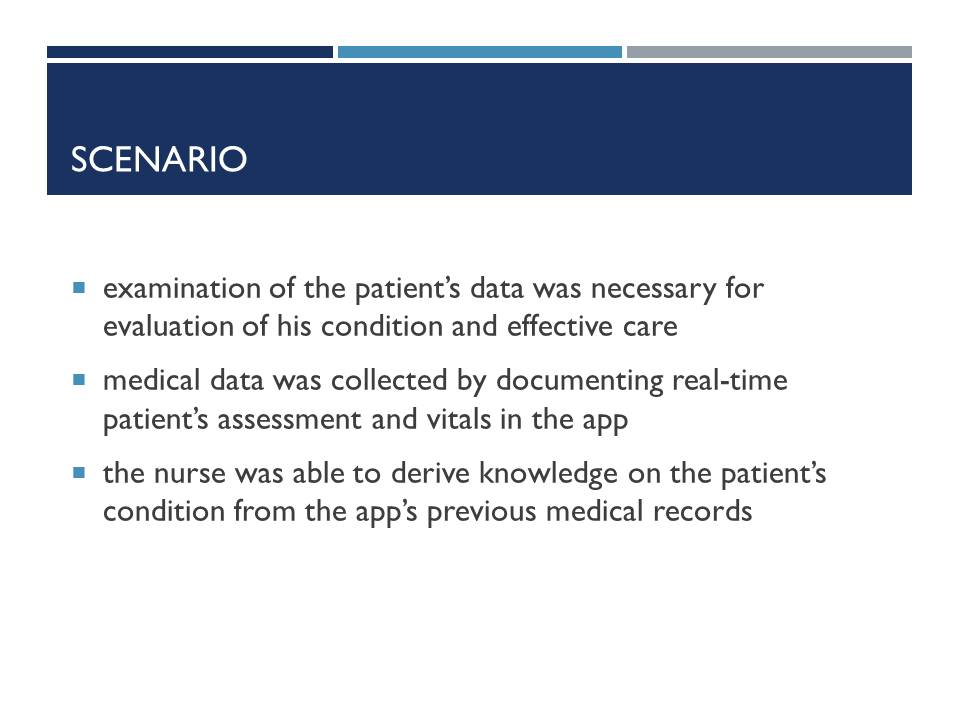
References
Finn, K., Ramsay, S., & Lail, J. B. (2016). Value streams empowering the knowledge worker. In L. Fischer (Ed.), Best practices for knowledge workers: Innovation in adaptive case management (pp. 87–96). Future Strategies Inc.
McGonigle, D., & Mastrian, K. G. (2017). Nursing informatics and the foundation of knowledge (4th ed.). Jones & Bartlett Learning.
Nagle, L., Sermeus, W., & Junger, A. (2017). Evolving role of the nursing informatics specialist. In J. Murphy, W. Goossen, & P. Weber (Eds.), Forecasting informatics competences for nurses in the future of connected health (pp. 212–221). IOS Press. Web.
Sweeney, J. (2017). Healthcare informatics. Online Journal of Nursing Informatics, 21(1). Web.